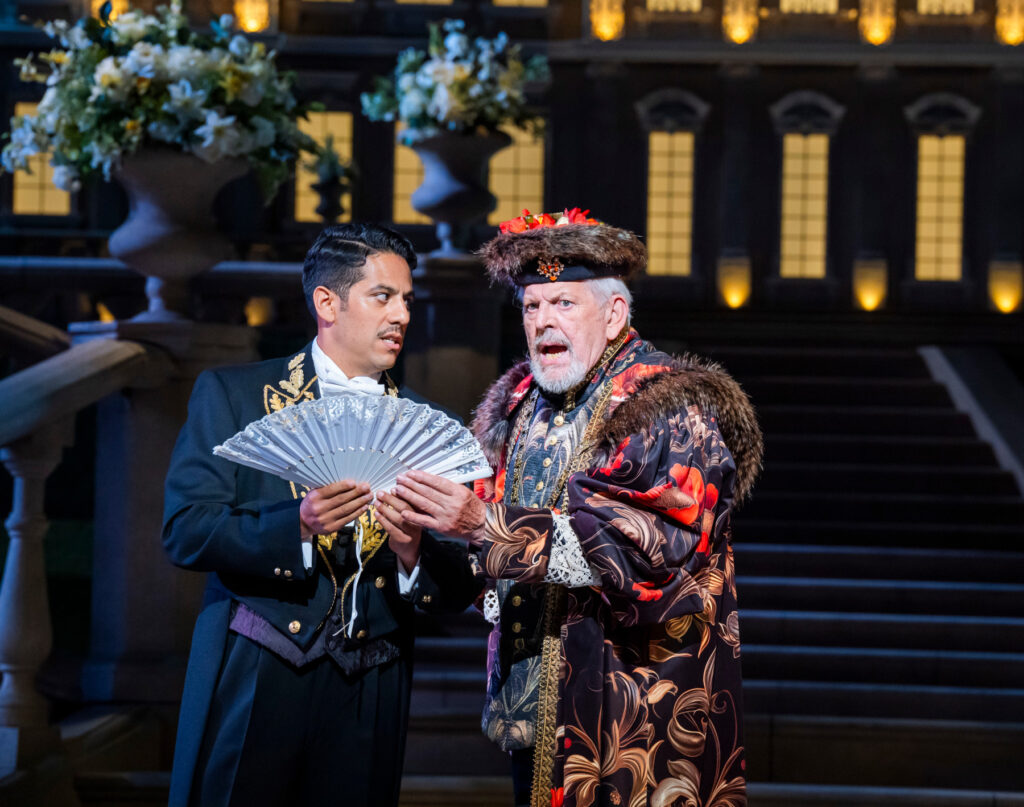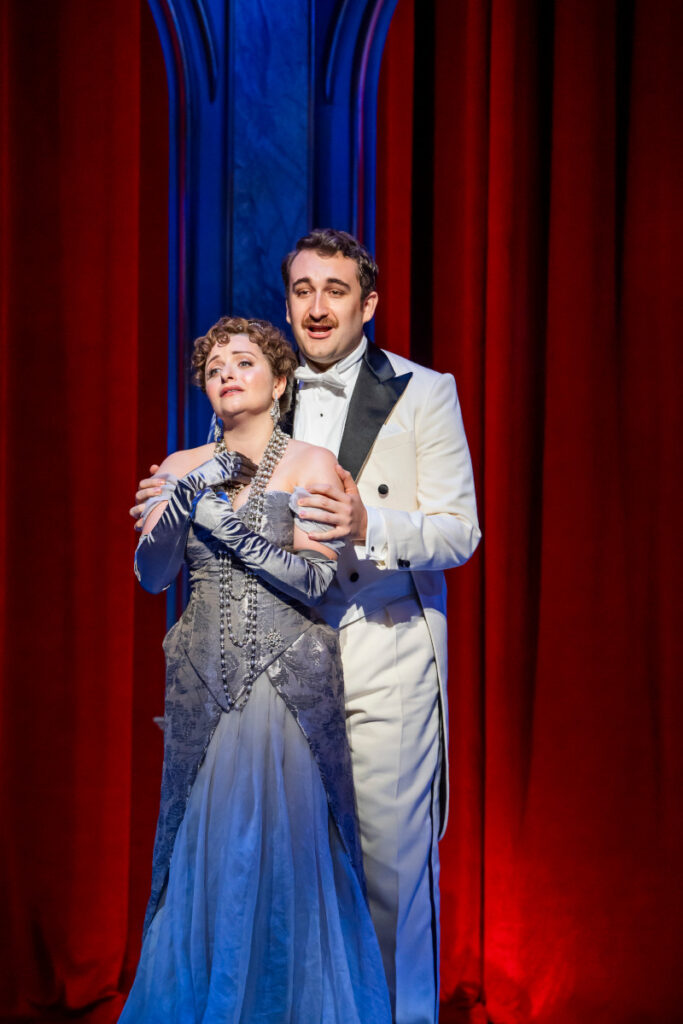Seen for the first time at Glyndebourne, this Merry Widow is a stylish romp that, in the hands of director Cal McCrystal, recalls the best of Broadway. Glamorous sets and costumes, superbly polished music-making and rib-tickling humour all combine to create an evening of pure escapism. That it’s nearly forty minutes longer than the scheduled timings may irritate some, but it matters little. So preoccupied is McCrystal with entertaining us that the music periodically feels secondary, but then he considers this operetta as a prototype Hollywood musical.
It’s a slick, sophisticated staging with a witty, tailor-made English translation by Stephen Plaice and Marcia Bellamy. And bolted on to Franz Lehár’s opulent score is a terrific stand-up routine from a very camp Tom Edden as the factotum Njegus, a natural communicator who brings his own end-of-pier humour. It’s a jolly start to proceedings before Gary McCann’s sumptuous set is revealed, Belle Époque echoes evoked by a sweeping staircase, glinting chandeliers and one too many proscenium arches, all gloriously lit by Ben Cracknell, and the whole conjuring the Golden age of Hollywood. Both the Glawari Villa and Maxim’s are no less lavish. Such is the grandeur and fast paced humour that one might forget the context of this fin de siècle work (it premiered in 1905) in which sexual intrigue and high society diplomacy are set against an unstable economic landscape.

Within its paper-thin plot, in which the survival of a nation’s finances depends on the outcome of the titular widow’s marriage, themes of honour and loyalty are almost upended by the fun and frolics. Chief amongst these is a hilarious summer house scene where the Camille de Rosillon cavorts with a blow-up replica of Valencienne, the wife of Baron Mirko Zeta, saucily choreographed by Carrie-Anne Ingrouille. And no more brilliantly staged is the comic routine of the drunken Count Danilo who tumbles down the embassy staircase to be revived by Njegus and building a scene straight out of Morecambe and Wise. Elsewhere, there’s the faultless timing of the song and dance caper where the veteran Thomas Allen (as Baron Zeta) is perfectly out of sync with his peers. Who would believe he gave his solo debut at Glyndebourne as Papageno in 1973? This sprightly veteran belies his age (80 in September) and captivates with wit and pathos as the cuckolded husband.
With all the theatrical antics one might easily forget Lehár’s assertion that “Operetta should never lose contact with human feelings and ideas. This is the secret of its impressiveness”. Certainly, a degree of poignancy is lost, but there is much to enjoy from the principal singers with well-defined characterisation from Danielle de Niese as Hannah Glawari. She compels both in terms of acting and vocally. Who cares if the voice is shorn of some of its radiance or acquired a little coarseness with the odd pinched high note? She has charisma in spades and looks the part when kicking her legs in the air with six other dancers at Maxim’s. She is well matched by Mexican baritone Germán Olvera as the honourable and urbane Danilo. His mahogany tones suit his initial brooding, the voice eventually warming and touching in his Act 3 waltz when he finally admits to Hannah that he has always loved her. It’s the evening’s emotional high point.

Elsewhere, soprano Soraya Mafi is a flighty Valencienne who dutifully returns to her husband, though not before indulging in one final passionate encounter with the stolid Michael McDermott as Camille. He’s not exactly a hot-headed won’t-take-no-for-an-answer sort of Frenchman, but the chemistry between them works convincingly enough. Cameo roles are all nicely done and the chorus sing with aplomb, clearly enjoying themselves in their sherbet-coloured gowns and elegant frock coats. And below stage, the London Philharmonic Orchestra under John Wilson is the last word in refinement. He has this music in his blood, and from curtain up to close he makes abundantly clear why he thinks Lehar’s work is “the best operetta ever written”. Few would argue with that in this instance, especially in the way Wilson seduces you with the music’s Viennese sensuousness. All in all, this Merry Widow is this summer’s unmissable treat.
Performances continue until July 28
David Truslove
The Merry Widow
Music composed by Franz Lehár
Libretto originally by Victor Léon and Leo Stein and updated for this production by Stephen Plaice and Marica Bellamy
Cast and Production Staff:
Danielle de Niese – Hanna Glawari; Germán Olvera – Count Danilo Danilovitsch; Thomas Allen – Baron Mirko Zeta; Soraya Mafi – Valencienne; Michael McDermott – Camille de Rosillon; Alex Otterburn – Viscount Cascada; Innocent Masuku – Raoul de St Brioche; Tom Edden – Njegus; Michael Wallace – Kronow; Rachel Taylor – Olga; Adam Marsden – Bogdanovitsch.
Director – Cal McCrystal; Designer – Gary McCann; Choreographer – Carrie-Anne Ingrouille; Lighting – Ben Cracknell; Conductor – John Wilson, London Philharmonic Orchestra; The Glyndebourne Chorus
Glyndebourne, Sussex, 9 June 2024
Top Image: Hanna Glawari (Danielle de Niese) with The Glyndebourne Chorus.
All photos by Tristram Kenton.